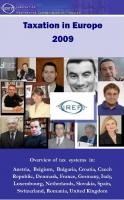What is the current state of public finance in the EU countries? How did the various governments reacted to the crisis which developed in the second half of 2008? To what extent did it trigger a change in tax policy? IREF has asked scholars and experts from fifteen different EU countries to present and evaluate the 2008 tax policies of their respective countries.
This resulted in 16 reports—Austria, Belgium, Bulgaria, Croatia, Czech Republic, Denmark, France, Germany, Holland, Italy, Luxemburg, Romania, Slovakia, Spain, Switzerland, United Kingdom—which, together, offer a fairly accurate picture of policy trends in the European Union. Publications comparing tax policies enacted in the EU member states are common (produced by public institutions—such as the European Commission, the World Bank or the OECD—as well as private ones—Economic Freedom of the World Index, Index of Economic Freedom, Ernst & Young, KPMG, Pricewaterhouse Coopers). While most—if not all—of those publications heavily rely on statistics, IREF report instead deliberately underline qualitative changes and causality. Another guiding principle for those contributions: their authors do not hesitate to describe, sometime with great details, the taxation mechanisms. For indeed, it is nor infrequent that a “great idea” stemming from the legislative body translates into a dreadful machinery. The reports below provide many instances of such scenari. In the same vein, the present reports do not hesitate to put in perspective political debate: how big is the gap between public discourse and implemented policies? Which governments turned out to be trustworthy? For those reasons, IREF 2009 yearbook on taxation in Europe provides a necessary complement to the statistical reports for whoever wishes to understand fiscal policies, and beyond, political trends.



